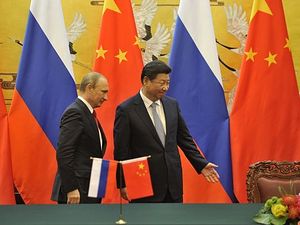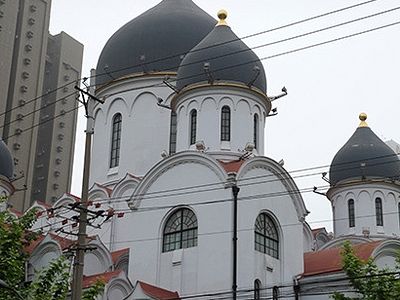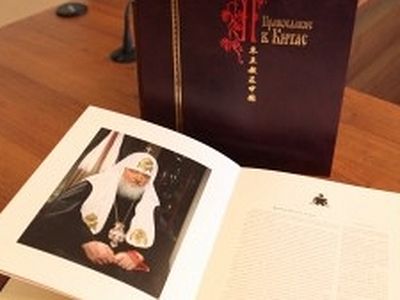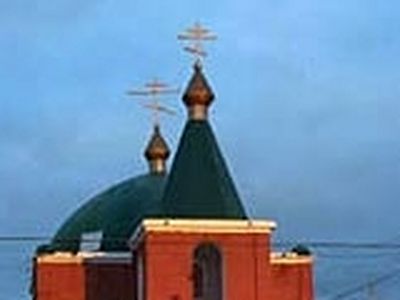Source: USA Today
Beijing, October 21, 2015
In the latest sign of warming ties between Moscow and Beijing, the Russian Orthodox Church ordained its first Chinese priest in 60 years, with the blessing of China's atheist, Communist rulers.
The rare move in the politically sensitive area of religion, which is tightly regulated in China, underscores how the two nations have moved closer at a time when each faces growing friction with the United States.
Yu Shi, a former banker also known as Aleksandr from the northeastern city of Harbin, took his vows at a ceremony in a church in St. Petersburg, Russia, this month following three years of training in a seminary there, church spokesman Dmitry Petrovsky told USA TODAY.
A video of the event posted on social media shows Yu, dressed in white robes, entering the Church of St. John the Evangelist in a procession of ornately dressed clergymen and speaking Chinese as he vows to devote his life to God.
He then kneels before a bishop in gold brocade who asks the congregation to pray “that the Holy Spirit and the grace of God descend ” on Yu, 42, who is married and has one daughter.
Petrovsky said Yu’s ordination was carried out with the full knowledge of China’s Communist authorities and that Yu would be allowed to work in the mainland when he completes his education.
“He will serve in the Church of the Protection of the Mother of God in Harbin,” Petrovsky said. China’s Religious Affairs Bureau declined to comment.
The ordination follows major deals signed by Russia and China on gas, aerospace and infrastructure in the last two years, as they find a common interest in opposing what they consider American hegemony in world affairs.
Russian President Vladimir Putin and Chinese President Xi Jinping also appear to enjoy a good personal relationship, having met over a dozen times in the last three years.
“It’s possible Putin asked this as a personal favor from Xi. It says nothing about religious freedom in China,” said Yang Fenggang, director of the Center on Religion and Chinese Society at Purdue University. “If China and Russia were not this close, the process would be more difficult.”
The Russian Orthodox Church has undergone a huge revival since the collapse of theSoviet Union in 1991, and despite his background as an atheist KGB officer, Putin has crafted an image of himself as defender of the faith.
In China, however, where the ruling Communist Party is still officially atheist, religion is a more complicated and controversial issue.
Though the Chinese constitution technically allows people to worship as they want, in reality, spiritual life is highly restricted, with the government recognizing only five national religions: Buddhism, Taoism, Islam, Protestantism and Catholicism. (The number of Christians range from 30 million, according to the government's Academy of Social Sciences to 70 million, according to the Pew Center.)
Those religions are governed — and their clergy normally appointed — by state-controlled organizations such as the Chinese Patriotic Catholic Association, which is independent of the Vatican.
Still, millions of people worship independently of those bodies, often in secret. In recent years, underground religious communities have come under increased scrutiny and harassment, according to human rights groups and the U.S. government.
Restrictions also have been tightened on state-approved religions, especially in the eastern province of Zhejiang, where hundreds of churches have been demolished or had their crosses removed in the last two years.
The Russian Orthodox Church says its Chinese arm — known as the Orthodox Church in China — has been exempt from overt crackdowns because its numbers are small, and it has legal protection as an “ethnic minority religion” in the provinces of Heilongjiang, Xinjiang and Inner Mongolia.
The Church says there are about 15,000 Chinese members and thousands more Russians living here, though Chinese estimates of practicing citizens is only a few thousand.
Still, its existence in China has not been easy. It received no support from Moscow in the Soviet era. During China’s 1966-76 Cultural Revolution, its clergymen were persecuted and almost all of its assets seized. The church’s onion-domed St. Sophia Cathedral in Harbin, built in 1907 after the completion of the Trans-Siberian Railway, is a museum today.
The church where Yu will work is a smaller one built in the 1930s. The last Orthodox Chinese priest died in 2000, and until Yu’s ordination there had been no one to carry out baptisms, marriages or funerals.
Believers say they initially kept the faith by listening to recordings of services sent from Russia and that more recently they have been able to access information and liturgies over the Internet.
Nothing, however, can substitute for having a priest who can communicate with them in Chinese. “The last 15 years were very difficult. It felt like our community was dying,” said Lyudmila Yuan, an Orthodox follower from Harbin.
While many Chinese Orthodox take Russian Christian names, they are Chinese citizens and often come from ethnic groups, like the Evenks, whose homeland straddles China’s border with Siberia.
Some, however, trace their roots back to the first practitioners of orthodoxy in China — a group of 50 Cossacks from the fort of Albazin on the Amur River who surrendered to Qing forces in 1685 and moved to Beijing. They became known as the Albazinians.
The church is hopeful that having negotiated Yu’s ordination, it can now train more Chinese priests and eventually gain national recognition.
Chinese experts say that is always likely to be a pipe dream because the Communist Party will only recognize faiths with millions of followers.
“It is not logical, but it is the way it is,” said Zhang Baichun, director of the Russian Cultural Research Center at Beijing Normal University.




